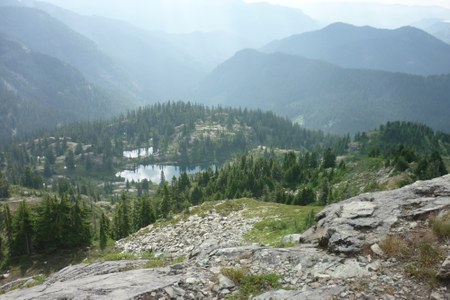
My wife and I hiked up to Rachel Lake last week. The hike hurt. I felt old. But what a glorious way to pain — a stroll through an incredible old growth forest, then a scramble up a steep hillside to a beautiful mountain lake in the amazing Alpine Lakes Wilderness. What a gift it is, to be able to hike through wilderness, just an hour or so from the urban core.
A gift indeed. With the 50th anniversary of the signing of the Wilderness Act on September 3rd of this year, I am grateful to everyone who worked on that campaign all those years ago, who had the vision and political drive to get the act passed. We are in your debt. The question is, how do we pay it forward?
Few of get us get to spend much time in a true wilderness. The wild has receded from our day-to-day existence. The best most of us can hope for might be a stroll through a weedy lot in the city. At least there, the sparrows and juncos find a meal and shelter on their own, with the added sustenance of a few pork rind packages tossed their way.
For those few of us who live near a capital ‘W’ wilderness, it's a privilege. When President Johnson signed the act that created the National Wilderness Preservation System 50 years ago, "for the use and enjoyment of the American People," as the act was written, he preserved and protected remnants of a once wild planet. But these 109 million acres and counting were also preserved for their inherent value — for being wild places still humming along to rhythms we humans can't fully control. Just knowing they are there can be a balm to an urbanized soul.
Wilderness is not just a place. It's a concept. A concept that is as fragile as it is majestic. Plants and animals that were once plentiful could be wiped out entirely with climate change — as they run out of higher, cooler elevations. For the American Pika already at the mountaintop, and the Marbled Murrelet facing the double whammy of plummeting ocean food sources and fewer old growth forests for nesting, an official wilderness designation won't much matter.
Management might help.
But is it still a wilderness when management plans are necessary to maintain them? Given how many of us there are and what we are doing to the planet, can the wilderness remain a place "where man is a visitor who does not remain"?
So, what do we do now, those of us who enjoy the benefit of that foresight? Birders in cities and towns far from wilderness areas won't be able to enjoy the migrating warbler at their backyard feeder if all this protected land turns to dusty isolated pockets. Duck hunters might wonder what good are the fields and ponds they have protected if they become ever more lonely places.
What kind of coalitions might form to preserve these places into the future? Hikers, climbers, runners, carbon sequestration advocates, heck, people who breathe, the potential for a broad coalition to protect, preserve, even expand wilderness is huge.
So are the pressures arrayed against it.
In signing the act 50 years ago, President Johnson said, “If future generations are to remember us with gratitude rather than contempt, we must leave them a glimpse of the world as it was in the beginning, not just after we got through with it." We have used up a lot of what was here in the beginning and are leaving future generations one big mess. For all our efforts, there will be contempt mixed with their gratitude.
Hiking up to Rachel Lake, we stood aside to let two couples have a clear path down through the rocks, roots and running water that came off the hillside. “Can’t figure out why this is harder going down than it was coming up,” was one woman’s comment.
“Ask your knees,” was my response.
“Yeah, this trail takes its toll,” the last man said as he passed us. “ We were in our teens when we started out."
It is a long trail.
So here we are, facing a steep climb, grateful for the vision that secured this hard hike, getting a little tired. We still have a long way to go.
This article originally appeared in our Nov/Dec 2014 issue of Mountaineer Magazine. To view the original article in magazine form and read more stories from our publication, click here.
 Steven Scher
Steven Scher